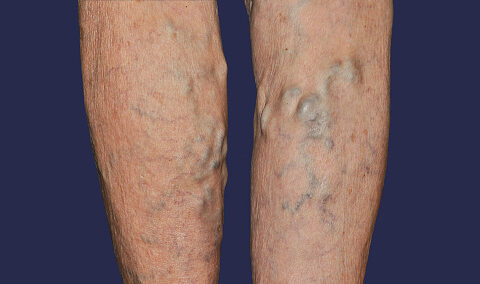5 Habits to Boost Your Cardiovascular Health
Five Habits to Boost Your Cardiovascular Health
Your heart works around the clock to keep you healthy and strong. But taking care of this vital organ doesn’t have to be complicated. The specialists at California Vein & Vascular Centers can teach you how to improve cardiovascular health and overall well-being for years to come. Despite heart disease being the leading cause of death in the United States, many heart problems are preventable. This guide will highlight five proven ways to improve cardiovascular health for our patients in the Greater San Jose and Monterey County areas. Whether you’re just beginning a heart healthy journey or hoping to enhance your current routine, you’ve come to the right place.

We’ll Help Strengthen Your Heart
At California Vein & Vascular Centers, we understand that good heart health is the foundation of overall wellness. Our experts work with patients to develop personalized plans for better cardiovascular health. We combine medical expertise with practical lifestyle guidance to help people achieve their health goals.
Our comprehensive approach includes diagnostic testing, care options, and ongoing support. We believe that education and prevention are just as important as treatment. That’s why we work closely with each patient to understand the best activities to improve cardiovascular health for their unique situations.
The Importance of Good Heart Health
Your cardiovascular system includes your heart, blood vessels, and blood. This network delivers oxygen and nutrients to every part of your body. When your cardiovascular system works well, you have more energy, better stamina, and a lower risk of serious health problems.
Poor heart health can lead to many complications. These include heart attacks, strokes, high blood pressure, and peripheral artery disease. Many of these conditions develop slowly over time. The earlier you start taking care of your heart, the better your long-term health outcomes will be.
How to Improve Cardiovascular Health
We’ve outlined five of the best ways to improve cardiovascular health below, but we encourage you to visit one of our clinics for help creating a customized plan.
Get Regular Exercise
Physical activity is one of the most powerful ways to improve cardiovascular health. Exercise strengthens your heart muscle, improves blood flow, and helps control blood pressure and cholesterol levels. When you work out, your heart pumps faster and works harder, strengthening the heart muscle. Regular exercise also helps your body use oxygen more efficiently. It can lower your resting heart rate and blood pressure while reducing inflammation.
Furthermore, physical activity helps control weight, which reduces strain on the heart. It also improves the body’s ability to manage blood sugar levels. This is especially important for preventing diabetes, which increases the risk of heart disease.
The American Heart Association recommends at least 150 minutes of moderate exercise per week. You will also benefit from 75 minutes of vigorous exercise weekly.
- Aerobic activities like walking, swimming, cycling, and dancing are excellent for heart health. But if you’re new to exercise, start slowly. Even 10-minute walks are beneficial.
- Strength training is also important. Try to include muscle-strengthening activities at least two days per week. This can include lifting weights, using resistance bands, or doing bodyweight exercises like push-ups.
Eat a Heart-Healthy Diet
What you eat directly affects your heart. A heart-healthy diet can help lower cholesterol, reduce blood pressure, and maintain a healthy weight. Tips include:
- Aim for at least five servings of fruits and vegetables per day. These foods are rich in vitamins, minerals, and fiber. They help reduce inflammation and provide antioxidants that protect your heart.
- Choose whole grains like brown rice, quinoa, and oats instead of refined grains to help control blood sugar and cholesterol levels.
- Include lean proteins like fish, poultry, beans, and nuts in your diet. Fish are especially beneficial because they contain omega-3 fatty acids.
- Limit saturated fats and trans fats. Also, read food labels and choose foods with less than 2,300 milligrams of sodium per day.
Schedule Regular Health Checkups
Regular medical checkups help catch heart problems early. Your doctor can monitor important numbers like blood pressure, cholesterol levels, and blood sugar. They can also assess your overall risk for heart disease. Don’t wait until symptoms appear to schedule an appointment. Many heart conditions develop without obvious warning signs. Regular checkups allow for early intervention when treatments are most effective.
Stay Hydrated and Limit Sugary Beverages
Proper hydration helps your heart pump blood more easily. When you’re dehydrated, your blood thickens, which makes your heart work harder to circulate it throughout the body. Aim for about eight glasses of water daily. Also, limit sugary beverages like soda, energy drinks, and sweetened coffee. These drinks may contribute to weight gain and diabetes, and they don’t provide water’s hydration benefits.
Prioritize Sleep and Manage Stress
Good sleep and stress management are often overlooked aspects of heart health, but both play important roles in cardiovascular wellness. Poor sleep can increase the risk of high blood pressure, diabetes, and obesity, which all increase heart disease risk. Adults should aim for seven to nine hours of high-quality sleep every night.
Chronic stress can also harm your heart. Stress hormones can raise blood pressure and increase inflammation. Long-term stress may also lead to unhealthy behaviors like overeating or smoking. Find healthy ways to manage stress. These might include exercise, meditation, deep breathing, and spending time with loved ones. Regular relaxation will help lower stress hormones and protect your heart.
Contact Us for a Consultation
Taking care of your heart doesn’t have to be overwhelming. Start with small changes and build healthy habits over time. Improving cardiovascular health is a journey rather than a destination. When you’re ready to take the next step, California Vein & Vascular Centers can help at our clinics in the Monterey County and Greater San Jose areas. Contact us today to schedule a consultation.


